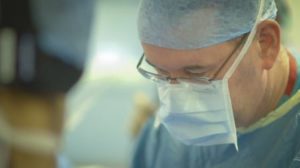Dr Mark Farrar
Dr Mark Farrar is one of our 15 Consultant Paediatric Anaesthetists and has been working at St George’s for 20 years.
His job is to provide anaesthesia for children of all ages from neonates through to adolescents when they require it.
Mark plays a key role in episode three of Baby Surgeons as the Consultant Paediatric Anaesthetist for baby Harry before he is born.
Here, we catch up with Mark…
What did you do before working here?
Before joining St George’s as a consultant I did most of my training while in the Royal Navy. I specialised in paediatric anaesthesia towards the end of my training by completing a fellowship at Great Ormond Street and another fellowship at The Hospital for Sick Children in Toronto.
What made you want to get into anaesthesia?
Anaesthesia has fascinated me since I first saw it as a medical student. The idea that you can make someone completely unconscious and pain free using different drugs is incredible but is a big responsibility. Imagine how awful life could be before anaesthesia was discovered.
How did you find filming for Baby Surgeons: Delivering Miracles?
I was proud to be involved in Baby Surgeons: Delivering Miracles. There are a number of teams involved in an EXIT procedure: obstetric anaesthetists, obstetric surgery, paediatric anaesthetists, ENT surgery and neonatology. All play a vital role and it is one of the best examples of teamwork and communication I have seen.
You played a key role in Zoe’s story in episode three when she undergoes an EXIT procedure to deliver baby Harry – can you tell us more about your role during this and the significance of it?
The EXIT procedure is performed because a baby has some sort of condition, diagnosed pre term, which means the baby may or may not be able to breathe unaided when it is born. The idea is to secure the airway by intubating the baby while it is still supported by the placenta. Only the baby’s head is delivered first and my role is to try to intubate the baby directly before the rest of the baby can be delivered and the support of the placenta stops. I find it quite daunting because, despite the advanced imaging available, you never know what you are going to find when you first have a look.
Have you been involved in many EXIT procedures before?
I work closely with the paediatric ENT surgery team on a weekly basis and with them have been involved with many of the EXIT procedures for over 15 years.
What would you say to someone who is interested in progressing into a similar career?
There’s no doubt a career in medicine is a vocation. It’s hard work, the hours are long and it’s stressful but it is greatly rewarding. It remains constantly challenging and you never stop learning. A career in medicine is a huge privilege, you are involved intimately in some of the most significant moments in people’s lives, both joyful and tragic. It’s not fiction it’s real life.


